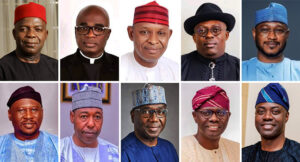Governors from Southern Nigeria have called for the consideration of each state’s ability to pay the new minimum wage, suggesting that each state should be allowed to negotiate with labor unions. This proposal came during the Nigerian Governors’ Forum (NGF) meeting, where the governors discussed the ongoing minimum wage crisis and committed to finding a mutually agreeable solution.

The issue of the new minimum wage has been a contentious topic, with organized labor expressing frustration over the delay in finalizing the new wage. Both public and private sector workers have been pushing for industrial action to expedite the process, citing the unbearable hardship caused by the current economic conditions.
During the National Economic Council (NEC) meeting, attended unusually by President Bola Tinubu, there was no discussion on the new minimum wage. Vice President Kashim Shettima also did not address the issue. However, the Southern Governors’ Forum issued a 16-point communique advocating for a minimum wage that reflects the cost of living in each state and allowing states to negotiate wages independently.
The NGF, which includes governors from all 36 states, reaffirmed their dedication to the ongoing negotiations and assured that better wages would result from these discussions. Present at the meeting were governors from various states, along with deputy governors from Akwa Ibom, Osun, and Borno States.
President Tinubu had established a tripartite committee in January to negotiate a new minimum wage, involving organized labor, federal and state government representatives, and the Organised Private Sector (OPS). However, the committee has struggled to reach an agreement, leading to an indefinite industrial action declared by labor unions on June 3, 2024. The strike significantly disrupted businesses, including airports, hospitals, and the national grid.
Labor unions argue that the current minimum wage of N30,000 is insufficient to support the average Nigerian worker, especially in light of inflation and the effects of recent government policies such as the removal of petrol subsidies and the unification of the forex windows. Despite relaxing their strike on June 4, following assurances from President Tinubu of a new minimum wage above N60,000, negotiations have yet to produce a final agreement.
Labor initially demanded N494,000, later reducing their demand to N250,000, while the government increased its offer from N60,000 to N62,000. Both sides submitted their reports to the President, who is expected to send an executive bill to the National Assembly for the new minimum wage to be passed into law.
In his Democracy Day speech on June 12, 2024, President Tinubu promised that an executive bill on the new national minimum wage would soon be sent to the National Assembly. He also indicated the need for wider consultation on the matter.
Amidst the delays, both public and private sector workers are becoming increasingly restless. They have been urging labor leaders to declare another industrial action to pressure the government into quickening the resolution process. Workers are particularly concerned about the lack of promised palliatives to cushion the effects of the fuel subsidy removal.
Labor leaders have been appealing for patience, noting that any eventual wage increase would include arrears. Meanwhile, the Senior Staff Association of Nigerian Universities (SSANU) criticized the slow pace of the President’s consultations, urging a faster resolution to meet the workers’ needs.
The call for state-negotiated minimum wages reflects the diverse economic realities across Nigeria’s states, highlighting the importance of tailored solutions to address workers’ welfare effectively. As the negotiations continue, the urgency for a fair and timely resolution remains paramount to alleviate the economic burdens on Nigerian workers.




